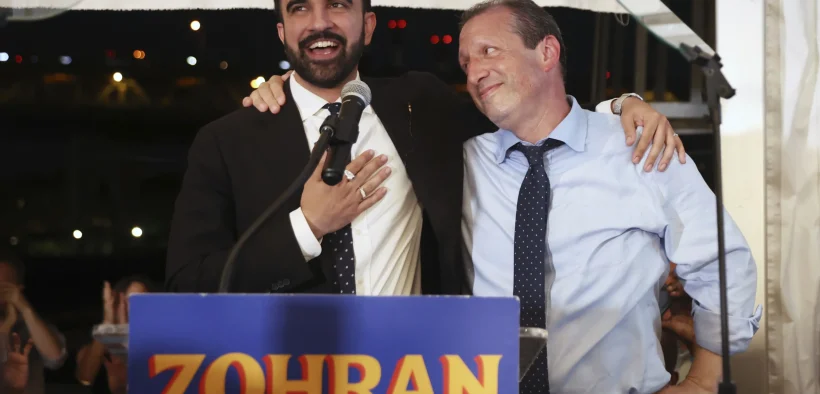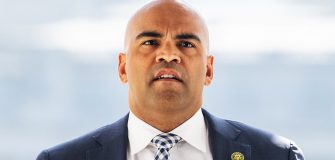Zohran Mamdani won the vibe war
Share

I recently spoke with dozens of Generation Z and younger-millennial New Yorkers — educated, engaged, all Democrats, and without exception, supporters of presumptive Democratic mayoral nominee Zohran Mamdani. There were atheists, Jews, and Muslims; some were gay, straight, or queer while others were wealthy and some were struggling.
Despite their differences, their political uniformity wasn’t what struck me most. It was the nature of their support. When asked why they backed Mamdani, they didn’t cite his policies or legislative work or offer any comments on his ideological positions and political behavior. What they all offered, instead, was the idea of mood.
To them, Mamdani represents a refreshing break from the current Democratic leadership in New York, which they view as calcified, self-interested, criminal, self-indulgent, and embarrassingly out of touch. The words they used to describe the establishment were striking: “ineffective,” “old,” and “gross.” Their rejection of the old guard wasn’t rooted in disagreement over policies. They wanted someone different. Someone younger. Someone who “seemed cool.” Someone who showed up.
That last phrase came up again and again: he showed up. Mamdani participated in community meetings, went to candidate forums, and spoke directly to the public. He didn’t duck debates. He made an effort. Contrast that with Andrew Cuomo, who, in his bid to return to politics via a mayoral campaign, often seemed detached and disinterested. He skipped major forums, including one on immigration hosted by the New York Immigration Coalition, a glaring absence reported by the New York Post. He phoned in public appearances, assuming that name recognition and past stature were enough.
They weren’t. And they aren’t.
What I heard from these young voters wasn’t just anecdotal chatter. It reflects a growing body of evidence in political science and psychology suggesting that, in today’s political climate, personality often eclipses policy as the primary driver of electoral behavior. A recent systematic review in Frontiers in Psychology confirms that voter choices are often determined less by a candidate’s stated platform than by the perception of the candidate’s personality traits: authenticity, warmth, boldness, and energy.
This is not a new phenomenon, but it is accelerating. Caprara and Zimbardo, in a foundational 2013 paper, argued that “people’s voting decisions may be guided by traits they value high in themselves.” In other words, voters don’t necessarily select the candidate whose ideas they agree with. They choose the one who feels like them. Personality becomes a proxy for trust, shared experience, and even moral alignment.
This was precisely the case with Mamdani’s supporters. Those I spoke with didn’t care to list policy positions or legislative accomplishments because they weren’t voting for those things. They were voting for him. For someone who seemed to share their sensibilities, frustrations, and sense of urgency.
One can view this shift through different lenses. On one hand, it marks a healthy skepticism toward professional politicians who have grown complacent and transactional. On the other hand, it raises real concerns about how thin our criteria for leadership have become. When effort and “vibes” outweigh experience and achievement, the result is governance that may be rhetorically compelling but practically incoherent and even dangerous.
The concern isn’t that Mamdani lacks sincerity; he clearly believes in what he’s doing. It’s that we now risk politics in which presence substitutes for substance, charisma outweighs competence, and the line between activist and administrator blurs beyond recognition.
This trend matters not just for New York City, but for governance nationwide. Personality-driven politics may yield initial energy and engagement, but it also risks shallow policymaking and political instability. Cities like New York, which face real structural challenges, from housing and transit to public safety and economic inequality, need leaders who do more than resonate emotionally. They need people who understand policy, institutions, and how to make government work.
It’s understandable why young voters are disillusioned. They’ve come of age watching leaders disappoint. Their demand for authenticity is not frivolous. It’s a cry for responsiveness. But that demand must be met with more than symbolic gestures or performative engagement. It must be answered with real leadership.
Andrew Cuomo misunderstood the moment. He presumed that political muscle memory and a legacy brand could overcome disinterest and detachment. That misreading reflects a larger failure among establishment Democrats: They continue to assume that credentials speak for themselves. They don’t anymore, certainly not to these younger generations.
WHITE HOUSE PUNTS ON REPUBLICAN CALLS TO DEPORT ZOHRAN MAMDANI
But the emerging, younger, and growing progressive left, with its emphasis on identity, narrative, and presence, must also be careful. Personality might win elections, but it won’t govern a city. And if New York City becomes a place where energy matters more than execution, the consequences will be borne not by politicians, but by the public.
Politics is changing. The new generation wants leaders who show up, listen, and embody their values. But showing up must be the beginning, not the end, of what it means to lead.
Samuel J. Abrams is a professor of politics at Sarah Lawrence College and a senior fellow at the American Enterprise Institute.













